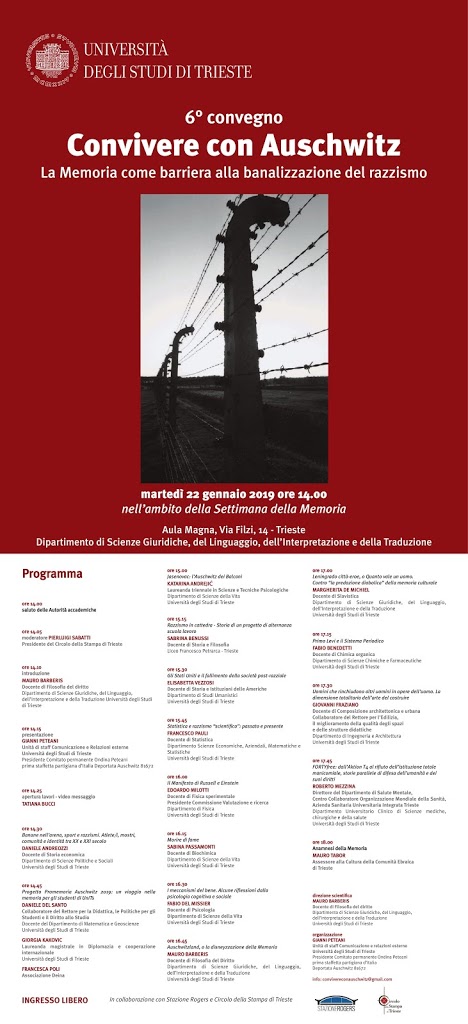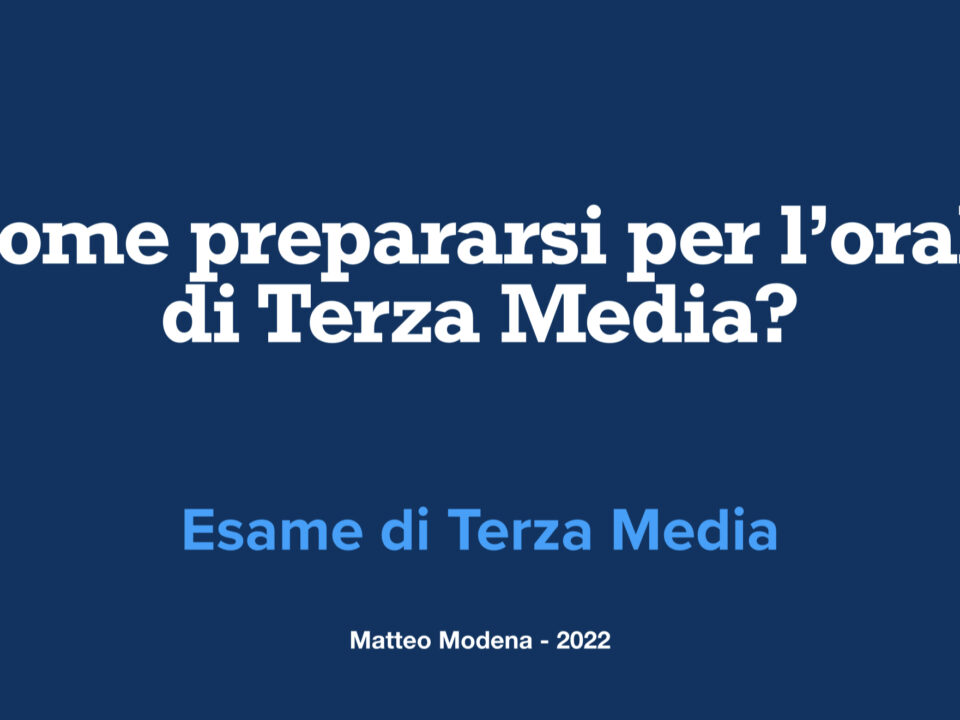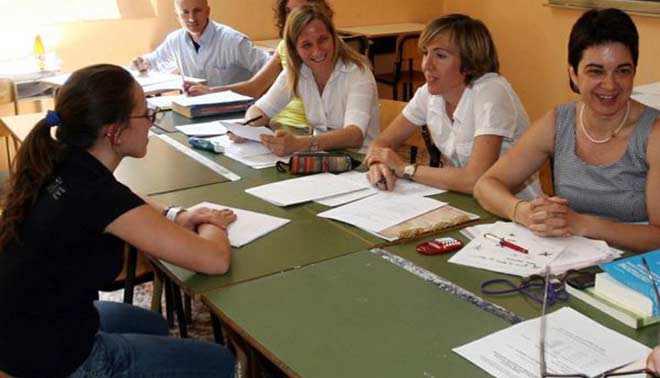


6° Convegno CONVIVERE CON AUSCHWITZ – martedì 22 gennaio 2019 – iniz…
10 Gennaio 2019

ESAMI DI STATO 1999 prova suppletiva
19 Gennaio 2019
Tema di: LINGUA STRANIERA
TESTO LETTERARIO- LINGUA INGLESE
(comprensione e produzione in lingua straniera)
It was a bright cold day in April, and the clocks were striking thirteen. Winston Smith, his chin nuzzled into his breast in an effort to escape the wild wind, slipped quickly through the glass doors of Victory Mansions, though not quickly enough to prevent a swirl of gritty dust from entering along with him.
The hallway smelt of boiled cabbage and old rag mats. At one end of it a coloured poster, too large for indoor display, had been tackled to the wall. It depicted simply an enormous face, more than a metre wide: the face of a man of about forty-five, with a heavy black moustache and ruggedly handsome features. Winston made for the stairs. It was no use trying the lift. Even at the best of times it was seldom working, and at present the electric current was cut off during daylight hours. It was part of the economy drive in preparation for Hate Week. The flat was seven flights up, and Winston, who was thirty-nine and had a varicose ulcer above his right ankle, went slowly, resting several times on the way. On each landing, opposite the lift-shaft, the poster with the enormous face gazed from the wall. It was one of those pictures which are so contrived that the eyes follow about when you move. BIG BROTHER IS WATCHING YOU, the caption beneath it ran.
Inside the flat a fruity voice was reading out a list of figures which had something to do with the production of pig-iron. The voice came from an oblong metal plaque like a dulled mirror which formed part of the surface of the right?hand wall. Winston turned a switch and the voice sank somewhat, though the words were still distinguishable. The instrument (the telescreen, it was called) could be dimmed but there was no way of shutting it off completely. He moved over to the window: a smallish, frail figure, the meagreness of his body merely emphasized by the blue overalls which were the uniform of the Party. His hair was very fair, his face naturally sanguine, his skin roughened by coarse soap and bl’unt razor blades and the cold of the winter that had just ended.
Outside, even through the shut window-pane, the world looked cold. Down in the street little eddies of wind were whirling dust and torn paper into spirals and though the sun was shining and the sky a harsh blue, there seemed to be no colour in anything, except the posters that were plastered everywhere. The blackmoustachiod face gazed down from every commanding corner. There was one on the house-front immediately opposite. BIG BROTHER IS WATCHING YOU, the caption said, while the dark eyes looked deep into Winstons own. Down at street level another poster, torn at one corner, flapped fitfully in the wind, alternately covering and uncovering the single word INGSOC. In the far distance a helicopter skimmed down between the roofs, hovered for an instant like a bluebottle, and d’arted away again with a curving flight. It was the police patrol, snooping into the peoples windows. The patrols did not matter, however. Only the Thought Police mattered…
Il testo è tratto da George ORWELL, Nineteen Eighty-four”
PL0A –
Tema di: LINGUA STRANIERA
TESTO LETTERARIO- LINGUA INGLESE
(comprensione e produzione in lingua straniera)
1. ANSWER THE FOLLOWING QUESTIONS:
1.1. Where is Winston Smiths flat situated?
1.2. Why cannot he use the lift?
1.3. What kind of pictures is the one shown on the poster?
1.4. What did Winston Smith hear when he entered the flat?
1.5. What is the telescreen” and why is there one in each flat?
1.6. Could it be turned off?
1.7. What are telescreens” for?
1.8. How does the police patrol carry out its task?
2. SUMMARIZE the content of the passage.
3. Composition: Can new technologies become oppressive of individual liberties? Discuss.”
_____________________________
Durata massima della prova: 6 ore.
E’ consentito l’uso dei dizionari monolingue e bilingue.
Non è consentito lasciare l’Istituto prima che siano trascorse 3 ore dalla dettatura del tema.
PL0A –
Tema di: LINGUA STRANIERA
TESTO DI ATTUALITÀ – LINGUA INGLESE
(comprensione e produzione in lingua straniera)
The Internet and the law
The Internet was supposed to be all about freedom. That is why governments want to regulate it. It is far from certain whether freedom, or government control, will win the day
In 1967 Roy Bates, a retired British army major, occupied an island fortress six miles off the English coast and declared it a sovereign nation. He was never sure what to do with his Principality of Sealand. Now, however, the fortress may have found its calling. For several months, a firm called HavenCo has been operating a data centre there. Anyone who wants to keep a website or other data out of the reach of national governments can rent space on the servers that hum in one of the concrete pillars.
In the mid-1990s, Sealand would have been seen as yet more proof that the Internet cannot be regulated. If a country tried to censor digital content, the data would simply hop to a more liberal jurisdiction. These days, the data principality symbolises just the opposite: the days of unrestricted freedom on the Internet are numbered, except, perhaps, in odd places like Sealand.
It seems likely that 2000 will be remembered as the year when governments started to regulate cyberspace in earnest; and forgot, in the process, that the reason the worldwide network became such an innovative force at all was a healthy mix of self-regulation and no regulation. In Britain, the Regulation of Investigatory Powers Act now gives the police broad access to e-mail and other online communications. South Korea has outlawed access to gambling websites. The United States has passed a law requiring schools and libraries that receive federal funds for Internet connections to install software on their computers to block material harmful to the young.
This year, governments are turning their attention to the many jurisdictional problems created by the Internet. These have been emphasised by a French ruling against Yahoo! on November 20th. The French court ordered the Internet portal firm to find some way of banning French users from seeing the Nazi memorabilia posted on its American sites, or face a daily fine of FFr100,000 ($13,000) from the end of February. Yahoo! is fighting the case, even though it has now stopped sales of Nazi memorabilia.
The case could be a taste of things to come. Under a new EU law, for example, European consumers may now sue EU-based Internet sites in their own countries, and the rule may well be extended internationally. The United States has just endorsed the gist of the Council of Europes cybercrime treaty, which aims to harmonise laws against hacking, Internet fraud and child pornography.
All this is a far cry from what leading Internet thinkers prophesied only five years ago. You (governments) have no moral right to rule us nor do you possess any methods of enforcement we have true reason to fear,” proclaimed John Perry Barlow in his 1996 Declaration of Independence of cyberspace”. Libertarian thinking also ran through early Internet scholarship. David Post and David Johnson, law professors at Temple University in Philadelphia and Georgetown University respectively, argued in that same year that cyberspace was a distinct place that needed laws and legal institutions entirely of its own.
Il testo è tratto da The Economist”, January 13th 2001, p. 19
PL0A –
Tema di: LINGUA STRANIERA
TESTO DI ATTUALITÀ – LINGUA INGLESE
(comprensione e produzione in lingua straniera)
ANSWER THE FOLLOWING QUESTIONS:
1. Who is Roy Bates?
2. What is the Principality of Sealand?
3. Give synonyms for the term calling” and the expression a far cry from”.
4. Who could be interested in renting space on HavenCos servers?
5. Make separate lists of the terms concerning computers, the Internet, and law.
6. Quote examples of government intervention in the Internet business.
7. Explain the meaning of the term cybercrime” and rewrite the sentence the U.S. has just endorsed the gist of the Council of Europes cybercrime treaty” in your own words.
8. Explain why John Perry Barlow did not agree with governments.
9. Say whether the two law professors shared his views. What was their attitude to the freedom of cyberspace?
SUMMARIZE the content of the passage.
COMPOSITION: The Internet does away with geographical boundaries. It could be the most liberating technology since the printing press. Discuss.
Alternatively, write about your experience as an Internet user or as a user of the new technologies in general.



